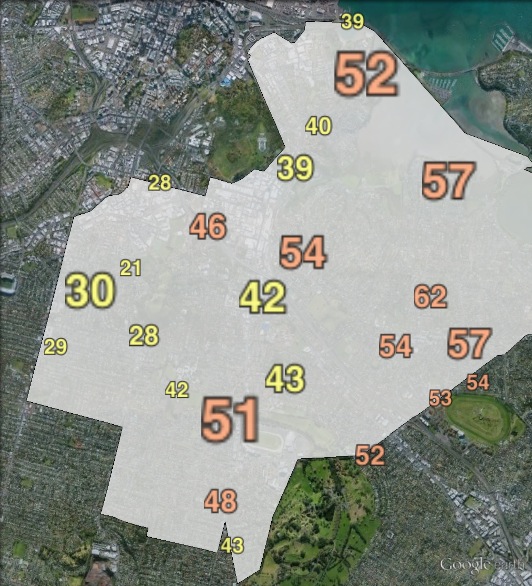I’m well on my way to preparing the maps of New Zealand’s electorates for the guide to the September election – yesterday I finished half of the general electorates (32 out of 64, plus 7 Maori seats).
The most interesting electorate I’ve worked on is the seat of Epsom in Auckland’s inner east.
Epsom is a very conservative, wealthy electorate, covering suburbs immediately to the east of the Auckland city centre. On the party vote, the National Party overwhelmingly wins the seat, with 64.5% of the party vote in 2011. Labour came second with 15.6%, followed by the Greens with 12%. But the seat produces a very different result in the vote for the local MP.
To win ‘list seats’ in the New Zealand Parliament, you need to either poll 5% of the party vote, or win at least one electorate seat. For parties polling below 5%, or in the difficult area where it is unclear whether they will pass the 5% threshold, winning an electorate seat can be critical to winning seats in Parliament.
The right-wing ACT party, who have been in a governing alliance with the National Party since the 2008 election, have used the seat of Epsom at every election since 2005 to ensure the party stays in Parliament, despite falling well short of 5% of the national party vote.
At the last three elections, ACT candidates have argued strongly for National voters in Epsom to cast their candidate vote for the ACT candidate, in order to allow the party to win seats in Parliament, and at the last two elections the Nationals have implicitly endorsed that strategy.
There is a very clear trend in election results in Epsom of National voters switching to vote for ACT on their candidate vote, but also of centre-left Labour and Greens voters flocking to the National candidate in an attempt to stop ACT from winning the seat.
The NZ Electoral Commission releases data breaking down the relationship between the party vote and the candidate vote, and allows you to see how many voters for each party then voted for each candidate, and vice versa. This data is released on a national level and by electorate. It allows you to see, for example, that 44% of those who gave a party vote to the Green Party then gave their candidate vote to Labour.
In Epsom, there is a very strong trend where 61% of National voters voted for the ACT candidate. In contrast, 56% of Green voters voted for the National candidate, as well as 37% of Labour voters.
You can also see this trend very clearly on the map. On the party vote, the National Party vote is higher in the more conservative east of the seat, further away from the Auckland city centre. Yet on the candidate vote, the National Party vote is higher in the west of the seat, where there are more party votes for Labour and Green.
The following maps illustrate this point. The final map shows the difference in the National vote between the party vote and candidate vote. In many booths in the east of the seat the National vote dropped by over 40%. Yet in the west of the seat, the National vote increased by 11% in one booth, and only dropped by less than 10% in other booths.
In 2011, this strategy of centre-left voters casting a tactical vote for National in order to block ACT failed, with John Banks winning the seat. But the party’s prospects had fallen so low that his win didn’t bring in a single list seat for the party. The party has changed leaders and Epsom candidates again in the last year, and we’re yet to see whether ACT will be given another lifeline in Epsom in 2014.

National party vote in Epsom at the 2011 general election.

ACT candidate votes in Epsom at the 2011 general election.

National candidate votes in Epsom at the 2011 general election.

Difference between National party votes and candidate votes per booth in Epsom at the 2011 general election.





